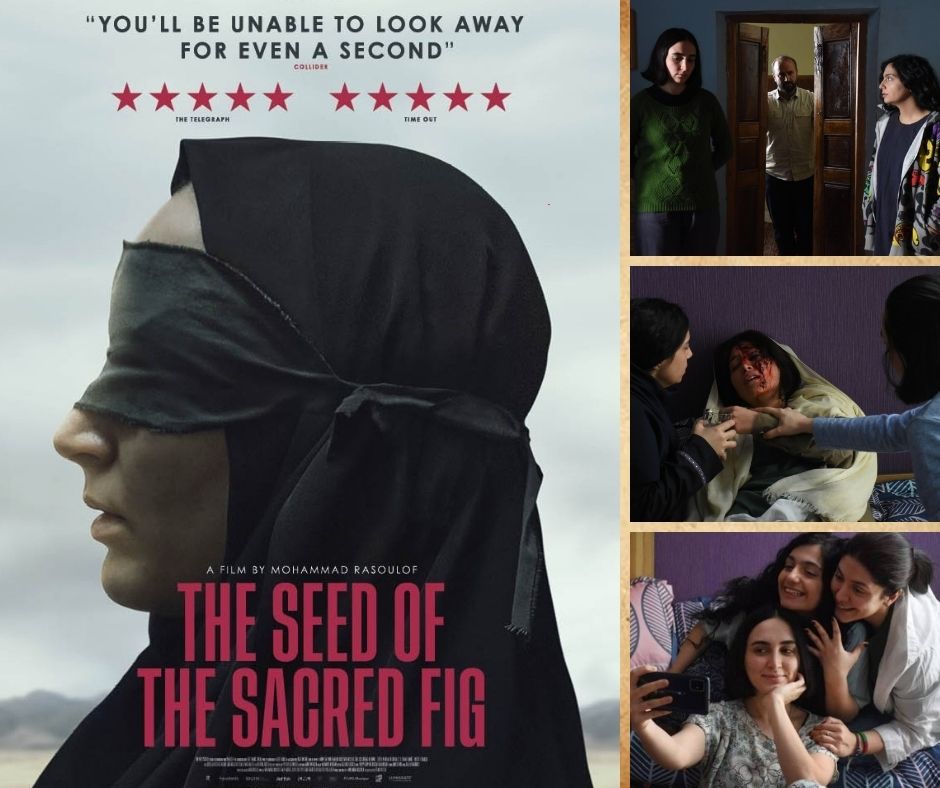The Seed of the Sacred Fig

The Seed of the Sacred Fig wastes no time explaining its title: in nature, some fig species grow by wrapping around another tree—eventually choking it to death. To plant that seed is to call for change, to uproot the suffocating systems of the past and fight for a freer, more hopeful future. It’s a metaphor that doesn’t just capture the heart of the story—it defines the essence of director Mohammad Rasoulof’s entire career.
Rasoulof has long been a fearless voice against tyranny, known for confronting themes of morality, resistance, and the personal cost of dissent. The Seed of the Sacred Fig, his tenth and perhaps most urgent work, continues that tradition with a boldness that mirrors the risks he took to make it. Shot in secret over 70 days, the film isn’t just a piece of political art—it’s an act of defiance. Rasoulof completed it knowing it could cost him his freedom. And it nearly did: after finishing the film, he fled Iran on foot, abandoning all his electronic devices to avoid surveillance. That real-world danger pulses through every frame, giving the story a raw, unshakable authenticity.
Even among the standout films at this year’s TIFF—like Brazil’s I’m Still Here—The Seed of the Sacred Fig feels the most essential. Where others document historical moments, Rasoulof’s film transcends borders, offering urgent insight into Iran’s political climate while resonating far beyond it. He skillfully blends real cellphone footage with fiction, grounding the story in reality without ever sacrificing narrative drive. The result is both emotionally gripping and politically enlightening—even if the final act struggles to live up to the harrowing promise of its opening chapters.
At the heart of the film is Iman, a devout lawyer newly appointed as an investigating judge at Tehran’s Revolutionary Court. His promotion brings the promise of security and status for his family—but at a steep moral cost: he must approve state-mandated sentences, including executions, all while remaining anonymous. As protests erupt across the country and his family begins to suspect his complicity in the regime’s actions, his wife Najmeh and daughters, Rezvan and Sana, grow increasingly disillusioned and defiant. Their diverging beliefs and rising tensions set the stage for a slow-burning ideological collision that forms the emotional core of the film.
The first two acts simmer with unease, immersing us in the family’s internal fractures with patience and precision. Rasoulof’s writing is sharp, and his characters are layered with contradiction and humanity. While the entire ensemble is excellent, Setareh Maleki gives a standout performance as Rezvan, the rebellious daughter whose inner turmoil is conveyed through glances, silences, and understated gestures. The family dynamic is portrayed with aching realism—their dinners, arguments, and quiet moments all loaded with tension and unspoken fears.
Unfortunately, Rasoulof undermines the elegance and power of these first two acts with a third act that shifts gears into a prolonged cat-and-mouse thriller. While suspenseful in its own right, this narrative pivot sidelines the family dynamic—the emotional core of the film—and isolates the characters during a climax that would’ve benefited from their continued interaction. The haunting stillness of the earlier chapters, marked by moments like a protestor’s wounded expression or the growing dread in a quiet household, gives way to something more conventional and less affecting. A more restrained, character-driven resolution would have preserved the emotional momentum built so carefully until then.
It’s a significant misstep, no doubt, but not enough to erase the film’s power. The Seed of the Sacred Fig remains a vital piece of cinema—unflinching in its portrayal of life under an oppressive regime, and deeply empathetic toward those caught in its machinery. Rasoulof’s ability to weave personal stakes with political urgency makes the film a powerful call to action: a reminder that even under suffocating rule, the pursuit of change is not only necessary—it’s sacred.
